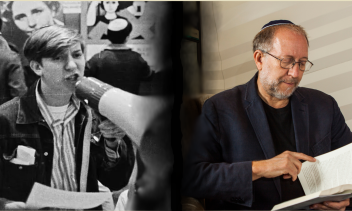Over the last three months, I facilitated an 18Forty Book Journey with a community of extraordinary people to discuss the subject of antisemitism (we used the term “anti-Judaism” since “antisemitism” has modern valances). We read Magda Teter’s Blood Libel, which explores the medieval origins of the classic and enduring accusation that Jews murder Christian children for ritual means; Steve Oney’s And the Dead Shall Rise, which recounts the circumstances surrounding the trial and lynching of Leo Frank; and David Nirenberg’s magisterial Anti-Judaism: The Western Tradition, an overview of how anti-Judaism has found a comfortable home in Christian and Muslim traditions, as well as in modern secular discourse.
Our conversations addressed three controversial issues. The first concerns whether Jew-hatred is comparable to other hatreds or whether it should be assessed as a unique bias. The second concerns whether contemporary anti-Judaism is an exclusively modern phenomenon or derives from older forms of Jew-hatred. The third, most pressingly, considered why people whose affiliations span the political and social spectrum continue to disseminate myths and conspiracies about Jews. Here’s what we uncovered.
You don’t need Jews to hate Jews.
What Makes Anti-Judaism Unique?
1. Jewish control is cunning. Anti-Judaism doesn’t merely hinge on the conviction that Jews bring suffering and evil into the world but that they are brought in devious and sneaky ways. This form of anti-Judaism claims that Jews recognize the truth of Christianity or Islam but deceive and mislead others to advance their own material interests, bring confusion into the world, and bring suffering upon the innocent. This is all done behind the scenes by Jews who appear to be good citizens and neighbors.
2. You don’t need Jews to hate Jews. The accusations that Jews are powerful but hidden, dangerous but devious, and puppeteers of universal chaos have allowed anti-Jewish discourse to flourish in the absence of Jews. From the second century, when Christians began to develop Adversus Ioudaiois (“Against the Jews”) literature, up until today, some of the most anti-Jewish countries in the world have little or no Jewish residents. Note, for instance, the recent story about a cocktail drink in León called “Kill Jews.” Jews have not lived in León for centuries.
3. “Jew” can become a dangerous accusation. David Nirenberg’s book in particular demonstrated how, in the absence of Jews, discourse about Jews became a set of ideas that Christians and Muslims put to work to argue with interlocutors who lived within their own faith traditions. The charge that one was a Jew had less to do with actual Jewishness than with how Christians and Muslims believed that one could embody Judaizing tendencies by embracing material, literal, and fleshly elements that threaten to estrange people from God and from salvation.
4. Ideas about Judaism fall onto real Jews. Conversations about Judaism as an idea that sowed suffering and evil were often projected back onto real Jews. This projection was extraordinarily dangerous for Jews of medieval Europe, particularly during Holy Week. Christians attending Church would listen to homilies accusing Jews of killing Jesus (and in some cases, of imitating Jesus’s crucifixion by ritually murdering young Christian children). Some of the Christians who heard this accusation would then leave their church and kill local Jews.
5. The “Jewish problem” is a global problem. The battle against figurative Judaism and real Jews was rarely framed as a regional or national conflict. Jews, not land, were perceived as purveyors of suffering and conflict, regardless of where they lived. The most famous example of this attitude successfully proliferating took place in Nazi Germany. If Hitler only cared about Jews in Germany, he would have focused only on eradicating Jews in Germany. His goal, however, was to annihilate Judaism by killing all Jews everywhere.
6. Jew-hatred operates through modern means. Jew-haters seeking to isolate Jews as dangerous and satanic employ the most modern technologies available to them to spread their ideas. From the printing press to TikTok, those who propagate myths and conspiracies about Jews are often experts of information dissemination. Perhaps counterintuitively, their messages have been most potent in places where Jews do not live. These ideas were effective not only because of the exciting technology employed but also because of the widespread receptiveness to interpret human suffering through the lens of anti-Jewish ideas.
7. Jew-hatred spans the political spectrum. Jews are accused of the very things that a given group or society fears most. When capitalism is seen as the source of all oppression, Jews are accused of controlling commerce and exploiting the working class. When a society views communism as the source of all suffering, Jews are accused of infiltrating stable governments to topple political structures. These accusations boil down to one idea: The suffering of good and innocent people derives from the scheming Jews. Because this accusation spans the political spectrum, Jews are weaponized as pawns in broader debates between opposing groups, who accuse one another of being manipulated and exploited by Jewish power.
Why the Jews?
This is a question that can barely be limited to a book, let alone an essay, but one answer concerns the unique theological problem that Jews and Judaism have posed to Christians and Muslims. To defend their theological claims, Christians and Muslims needed to reject Jews and Judaism while maintaining the correctness of Jewish scriptures, prophetic teachings, and ethical traditions. This demand has produced unique problems and solutions. One such solution is to demonize Jews while asserting the truth of their tradition. According to this approach, Jews fundamentally misunderstand their own traditions. Jewish survival, moreover, is explained not as a reflection of God’s covenantal love for the Jewish people, but as a fulfillment of the specific role in the theological lives of God’s true people.
To defend their theological claims, Christians and Muslims needed to reject Jews and Judaism while maintaining the correctness of Jewish scriptures, prophetic teachings, and ethical traditions.
Other theories about what spurs anti-Judaism have to do with the notion that there is a long-standing, deep-seated envy against Jews, upon whose scriptures and innovations Christianity and Islam rest. According to this view—advanced by ancient writers such as Josephus and Philo, as well as some modern thinkers today—this dependence, combined with the Jews’ unlikely economic and political resilience despite limitations placed upon them, has bred envy and resentment.
Perhaps the most widespread explanation concerning anti-Judaism is that there is no explanation. This position, which appeals to many Jews of faith, presumes that the Jewish People’s story lies at the center of an inscrutable divine plan that shuttles humanity toward a universal redemption. This approach treats anti-Judaism as a divinely ordained phenomenon that is illogical by design, and necessary for fulfilling this plan.
Where Does That Leave Us?
Our Book Journey closed with a pragmatic question: What’s a Jew to do? We considered a number of ways to respond to Jew-hatred with reason and logic, and settled on a response that begins with the internal work that Jews can do within their own communities. In particular, we discussed the possibility of investing in the cultivation of a distinctive, unassimilated identity that refuses to dissolve the boundaries that separate Jews from other peoples. This approach provides Jews with the agency to define themselves on their own terms rather than to accept the role that others have assigned them, which has Jews play an antagonizing role on the theological stages of others.
Perhaps the most effective way for Jews to respond to Jew-hatred, then, is to continue the work of imbuing their communities with dignity, strength, and confidence in their own goodness—especially when others deny them of these very traits. This work, and the radical optimism of believing in the inherent goodness of most people, can help Jews to confront the scourge of Jew-hatred with confidence and strength.
Malka Z. Simkovich is the Crown-Ryan Chair of Jewish Studies and director of Catholic-Jewish Studies at Catholic Theological Union in Chicago. She is the author of The Making of Universalism: From Exile to Alexandria and Discovering Second Temple Literature: The Scriptures and Stories That Shaped Early Judaism. Her next book, Letters From Home: The Creation of Diaspora in Jewish Antiquity, is coming out in June 2024.








